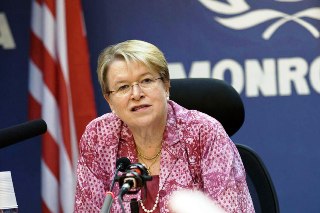South Sudan faces persistent challenges to peace, Security Council told
November 17, 2016 (JUBA) – Briefing the United Nations Security Council for the last time, the Special Representative of the Secretary-General for South Sudan called on the 15-member body to continue to accord priority to the country and to consider the future of its people in taking any decisions.

“I urge all involved and especially the South Sudanese leaders never to lose sight of the ultimate goal – a peaceful and prosperous future for the people of South Sudan,” she added.
Ms. Løj underscored that the difference between the success and failure of the South Sudanese Peace Agreement lay in its comprehensive and inclusive implementation by its parties and called for sustained regional and international support to the country.
Further in her briefing, she highlighted that the security situation in the country, particularly in the Greater Equatorias, in parts of Unity, and Western Bahr el Ghazal states, remained volatile, with frequent attacks that resulted in civilian casualties and displacement, as well as disrupted supply of essential goods, including food.
The envoy also said the increasingly fragmented conflict – often with ethnic undertones – continued to push the country towards further division and risked a full-scale civil conflict.
“Much more needs to be done by the Transitional Government [of National Unity] to put a stop to these security incidents that contribute to an environment of instability and violence, lead to displacement and exacerbate the already dire humanitarian situation,” she said, underscoring the need to take actions that arrest the increasing ethnic tensions.
UNMISS chief cites ‘dire’ humanitarian situation
Ms. Løj, also the head of the UN Mission in South Sudan (UNMISS), informed the Council that despite an agreement between the Government and the Mission on freedom of movement, military commanders on the ground were either not informed of or disregarded the agreement, causing significant challenges to the Mission’s movement and patrols.
In addition, she drew attention to the humanitarian situation that remained “dire” with some 4.8 million people estimated to be severely food insecure and farmers in parts of the country likely to miss the upcoming planting season due to lack of availability of seeds, caused by fragile security.
“Our humanitarian colleagues are doing their outmost best to reach people in need but they continue to face obstacles in terms of movement, bureaucratic procedures and criminality,” she said.
This briefing was Ms. Løj’s last briefing to the Security Council in her current post. She steps down from these positions at the end of November.
(ST)
